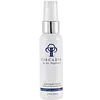What's inside
What's inside
 Key Ingredients
Key Ingredients

 Benefits
Benefits

 Concerns
Concerns

 Ingredients Side-by-side
Ingredients Side-by-side

Water
Skin ConditioningHexyldecanol
EmollientPropanediol
SolventCetearyl Alcohol
EmollientGlyceryl Stearate
EmollientPEG-100 Stearate
Ceteareth-20
CleansingCetearyl Glucoside
EmulsifyingDimethicone
EmollientCarbomer
Emulsion StabilisingTocopheryl Acetate
AntioxidantAllantoin
Skin ConditioningSodium Hydroxide
BufferingCaprylyl Glycol
EmollientHexylene Glycol
EmulsifyingMethylisothiazolinone
PreservativeBenzoyl Peroxide 2.5%
Water
Skin ConditioningEthoxydiglycol
HumectantCyclotetrasiloxane
EmollientCyclopentasiloxane
EmollientPropylene Glycol
HumectantCetearyl Alcohol
EmollientDimethicone
EmollientGlyceryl Stearate
EmollientPEG-100 Stearate
Panthenol
Skin ConditioningAllantoin
Skin ConditioningXanthan Gum
EmulsifyingCeteareth-20
CleansingCarbomer
Emulsion StabilisingSodium Hydroxide
BufferingDiazolidinyl Urea
PreservativeMethylparaben
PreservativePropylparaben
PreservativeParfum
MaskingBenzoyl Peroxide 2.5%, Water, Ethoxydiglycol, Cyclotetrasiloxane, Cyclopentasiloxane, Propylene Glycol, Cetearyl Alcohol, Dimethicone, Glyceryl Stearate, PEG-100 Stearate, Panthenol, Allantoin, Xanthan Gum, Ceteareth-20, Carbomer, Sodium Hydroxide, Diazolidinyl Urea, Methylparaben, Propylparaben, Parfum
 Reviews
Reviews

Ingredients Explained
These ingredients are found in both products.
Ingredients higher up in an ingredient list are typically present in a larger amount.
Allantoin is a soothing ingredient known for its protective and moisturizingg properties. Because of this, it is often added to products with strong active ingredients.
Studies show higher concentrations of this ingredient can promote wound healing.
Though it can be derived from the comfrey plant, allantoin is produced synthetically for cosmetic products to ensure purity.
Learn more about AllantoinCarbomer is a polymer of acrylic acid. Its main role is to create a gel consistency.
A high amount of carbomer can cause pilling or balling up of products. Don't worry, most products contain 1% or less of carbomer.
Ceteareth-20 is an emulsifier and cleansing agent. It is derived from cetearyl alcohol, a fatty alcohol.
As an emulsifier, Ceteareth-20 prevents oil and water from separating. It is also a surfactant. Surfactants help gather oil, pollution, and dirt to be washed away.
Cetearyl alcohol is a mixture of two fatty alcohols: cetyl alcohol and stearyl alcohol. It is mainly used as an emulsifier. Emulsifiers help prevent the separation of oils and products. Due to its composition, it can also be used to thicken a product or help create foam.
Cetearyl alcohol is an emollient. Emollients help soothe and hydrate the skin by trapping moisture.
Studies show Cetearyl alcohol is non-toxic and non-irritating. The FDA allows products labeled "alcohol-free" to have fatty alcohols.
This ingredient is usually derived from plant oils such as palm, vegetable, or coconut oils. There is debate on whether this ingredient will cause acne.
Due to the fatty acid base, this ingredient may not be Malassezia folliculitis safe.
Learn more about Cetearyl AlcoholDimethicone is a type of synthetic silicone created from natural materials such as quartz.
What it does:
Dimethicone comes in different viscosities:
Depending on the viscosity, dimethicone has different properties.
Ingredients lists don't always show which type is used, so we recommend reaching out to the brand if you have questions about the viscosity.
This ingredient is unlikely to cause irritation because it does not get absorbed into skin. However, people with silicone allergies should be careful about using this ingredient.
Note: Dimethicone may contribute to pilling. This is because it is not oil or water soluble, so pilling may occur when layered with products. When mixed with heavy oils in a formula, the outcome is also quite greasy.
Learn more about DimethiconeGlyceryl Stearate is a mix of glycerin and stearic acid.
It is used to stabilize the mixing of water and oil ingredients. By preventing these ingredients from separating, it can help elongate shelf life. It can also help thicken the product's texture.
As an emollient, it helps soften skin and supports barrier-replenishing ingredients.
In cosmetics, Glyceryl Stearate is often made from vegetable oils or synthetically produced.
This ingredient may not be fungal-acne safe
Fun fact: The human body also creates Glyceryl Stearate naturally.
Learn more about Glyceryl StearatePeg-100 Stearate is an emollient and emulsifier. As an emollient, it helps keep skin soft by trapping moisture in. On the other hand, emulsifiers help prevent oil and water from separating in a product.
PEGS are a hydrophilic polyether compound . There are 100 ethylene oxide monomers in Peg-100 Stearate. Peg-100 Stearate is polyethylene glycol ester of stearic acid.
Sodium Hydroxide is also known as lye or caustic soda. It is used to adjust the pH of products; many ingredients require a specific pH to be effective.
In small amounts, sodium hydroxide is considered safe to use. However, large amounts may cause chemical burns due to its high alkaline.
Your skin has a natural pH and acid mantle. This acid mantle helps prevent harmful bacteria from breaking through. The acid mantle also helps keep your skin hydrated.
"Alkaline" refers to a high pH level. A low pH level would be considered acidic.
Learn more about Sodium HydroxideWater. It's the most common cosmetic ingredient of all. You'll usually see it at the top of ingredient lists, meaning that it makes up the largest part of the product.
So why is it so popular? Water most often acts as a solvent - this means that it helps dissolve other ingredients into the formulation.
You'll also recognize water as that liquid we all need to stay alive. If you see this, drink a glass of water. Stay hydrated!
Learn more about Water